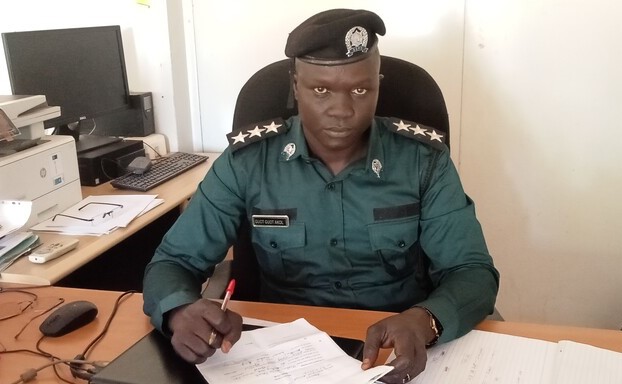Police in Aweil have released on bail five foreign teachers who were detained after their colleague suspected of defiling a 17-year-old student escaped. Continue reading 5 foreigners released on bail over defilement case in Aweil
Category: Justice
Trial adjourned for Warrap eye-gouging suspect over lack of lawyer
Juba’s Gender-Based Violence Court on Tuesday adjourned the first hearing into the case of a man who allegedly gouged the eyes of his 17-year-old daughter in Warrap State, over the absence of a lawyer to represent the defendant. Continue reading Trial adjourned for Warrap eye-gouging suspect over lack of lawyer
Jur River man arrested for deadly grenade attack
Police in Wau have arrested a suspect who detonated a grenade at the market in Jur River County, killing four people and injuring dozens to get back a loan.
Continue reading Jur River man arrested for deadly grenade attack
Justice ministry screens 400 law graduates in recruitment scheme
The Ministry of Justice and Constitutional Affairs has conducted a written interview for 400 graduates of law to fill vacant positions in the institution. Continue reading Justice ministry screens 400 law graduates in recruitment scheme
NBGs police recorded 364 crime incidents in July
At least 364 criminal incidents including 46 rape and adultery cases were recorded in Northern Bahr el Ghazal State in July, the police said. Continue reading NBGs police recorded 364 crime incidents in July
9 murder suspects bailed out after two-year arbitrary detention
Nine police officers who were accused of killing Maridi County Police Commissioner in 2021 have been bailed out after spending two years in jail without trial, a human rights lawyer has said. Continue reading 9 murder suspects bailed out after two-year arbitrary detention
GBV cases on the rise in Pibor, Upper Nile State – police
South Sudan National Police Service has raised an alarm over the reports of rampant cases of Gender Based Violence (GBV) in the Pibor Administrative Area and Upper Nile State. Continue reading GBV cases on the rise in Pibor, Upper Nile State – police
No conjugal visits as Juba prison lacks space -officer
Overcrowding at Juba Central Prison has forced the authorities to suspend conjugal visits as inmates sleep while standing due to the lack of space, according to the Director.
A conjugal visit is a scheduled period in which an inmate of a prison or jail is permitted to spend several hours or days in private with a visitor.
The visitor is usually their legal spouse.
According to the Prison’s regulation, conjugal visits are meant for inmates with long jail terms of 30 or 10 years as long as he or she fulfills some conditions.
These include providing a marriage certificate and passing a medical test to avoid transmission of sexual diseases.
If a prisoner violates these, he or she loses the privilege in accordance with section 101 of South Sudan prison bylaws.
Despite these rights, Lieutenant General Atok Atem Barac Director of Juba National Prison says the facility is constrained by lack of space to grant inmates conjugal rights.
“Prison Regulations Section 101 allows family visitation, but despite that, there is a problem represented in the narrowness of the place, which cannot even accommodate the inmates to sleep, ” he said
General Barac says the number of inmates today in the facility is 2,912 while the prison was built to accommodate 500 inmates only.
“If only there were humanitarian organizations that would intervene and build three rooms that would allow these prisoners to exercise their natural (conjugal) rights to human beings and enjoy some privacy, he appealed
He added that due to the overcrowding, inmates are sleeping while standing or sitting.
“Now there are more than 2,000 prisoners inside, and the shop has become so crowded that you cannot sleep. I can only sit. Or sleep standing up.
US, UK demand credible investigation into Journalist Allen’s death
The U.S. and U.K. Embassies have renewed calls on the transitional Government of South Sudan to conduct a credible investigation into the death of Christopher Allen.
Christopher Allen was killed six year ago while working as a journalist covering clashes between the SPLA government forces and (SPLA-IO).
The government of South Sudan has not yet published an official investigation into the death of Allen, despite international pressure on the government to identify and hold to account the culprits behind his killing.
After six year of his death, US and UK embassies say Mr. Allen’s family, friends, and colleagues deserve answers.
In a joint press stated today, call for a credible investigation and accountability is about more than just Mr. Allen’s case—it is about the right of journalists to work in safety and about ending impunity for violence and crimes against them.
They also requested government to make the results public, and to ensure accountability.
Lologo mother dumps baby in pit latrine
A newly-born baby boy has been rescued at the Lologo suburb in Juba after the mother dumped him into a pit latrine, witnesses said. Continue reading Lologo mother dumps baby in pit latrine

